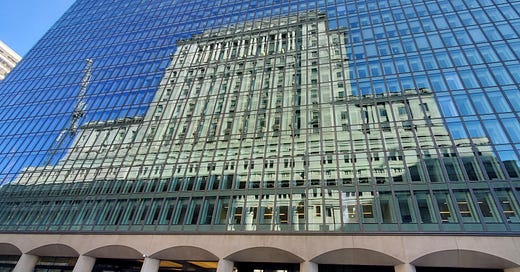The Tragedy of Google Search, The Atlantic, Charlie Warzel, September 22, 2023
Unlike its streamlined, efficient former self, Google Search is now bloated and overmonetized. It’s harder now to find answers that feel authoritative or uncompromised; a search for healthy toddler snacks is overloaded with sponsored product placement, prompts to engage with “more questions” (How do you fill a hungry toddler? “Meat and Seafood. Bring on the meat!”), and endless, keyword-engorged content. Using Google once felt like magic, and now it’s more like rifling through junk mail, dodging scams and generic mailers.
A friend of mine on Twitter said once that to find anything useful on Google, you have to add “reddit” to your search—that will pull up Reddit threads where actual people are discussing the question you’re asking. I find myself doing this pretty much any time I need to find out something important. (“Best concrete sealer reddit”; “What kind of mouse traps really work reddit”; “Is it safe to eat scallops raw reddit.”)
Amazon feels like this too: cluttered with spammy and sometimes fake products. Twitter feels like this. The whole internet feels like this.
This is interesting, on that note:
Last fall, the former Googler and ex–Yahoo CEO Marissa Mayer offered a charitable explanation as to why Google Search feels worse, arguing that the search engine is merely a reflection of the internet as a whole, which has become more complex and laden with fraudsters and garbage. The explanation lets Google off the hook a bit: The company’s chief purpose is to navigate the sprawling morass of information, after all. Ultimately, it’s a tacit admission that Google has tried and failed to tame the web.
In other words, there’s no policeman; no authority. No real source other your own time and intuition to determine what’s real and what’s junk. At some point, the urge to put down the device and unplug takes over. And that’s probably a healthy response.
Searching for Our Mississippi, Chicago Magazine, Edward Robert McClelland, Photography by David Kasnic, August 1, 2023
I love this:
My work is confined to Illinois. I just finished writing a book about Abraham Lincoln and Stephen Douglas. Seeking out all seven debate sites — Ottawa, Freeport, Jonesboro, Charleston, Galesburg, Quincy, and Alton — felt like an adventure equal to visiting the seven continents. If I cannot travel widely, I will try to travel deeply.
This too:
The Argosy Casino Alton, the oldest casino in Illinois, opened in 1991 as the Alton Belle. Riverboat gambling was introduced to revive the old river ports. A local politician predicted the Belle would “breathe new life into Alton.” In a process resembling mammalian evolution, the casinos first cruised the river, then were moored to docks, then were simply born on land, although gambling is still referred to as “going to the boats.”
And this bit about Cairo, a deeply depressed semi-abandoned mall city on the river:
I knew Shemwell’s is the best restaurant in Cairo. I didn’t know it’s the only restaurant left in Cairo. Subway couldn’t make it here. COVID closed the Nu Diner. Alexander County, of which Cairo is the seat, lost 36 percent of its population in the last census, more than any other county in the United States. The Department of Housing and Urban Development closed two low-rise housing developments, dispersing 500 residents throughout southern Illinois, and is planning to shut down a high-rise next.
Even so, people often don’t want to leave places like this, or can’t:
“My dad,” she says in a soft Lower Mississippi drawl, sounding like she’s from Missouri or Arkansas rather than Illinois. “He was born and raised here. As long as he’s here, I’m here.”
Read the whole piece. It’s a window into a different world right here at home.
“I don’t believe the battery technology is there for a big tractor,” Hediger said. “Even if it was, people would be nervous about the weight. We don’t want to be hauling huge amounts of weight out in our field and creating compaction.”
Interestingly, the weight of the batteries and the over-compacting of the soil is the biggest issue here, not the viability of the technology itself, though cost is also a major factor. There aren’t electric tractor incentives the way there are for cars.
Some electric buses have a similar problem—the batteries are so heavy they cause cracks to the chassis. There are some ways in which batteries have really advanced—phones, lawn equipment, cars—and others where they’re not there yet.
Today’s fourth link is an interactive GIS project showing old waterways in Washington, D.C. Check it out!
Related Reading:
Thank you for reading! Please consider upgrading to a paid subscription to help support this newsletter. You’ll get a weekly subscribers-only piece, plus full access to the archive: over 700 pieces and growing. And you’ll help ensure more like this!



